Dr. Vladimir Meglič, Ecobreed coordinator is today live on Radio Ö1 at 7:05pm
https://oe1.orf.at/programm/20190117/540159
Stay tuned ![]()
Improving crops
Dr. Vladimir Meglič, Ecobreed coordinator is today live on Radio Ö1 at 7:05pm https://oe1.orf.at/programm/20190117/540159 Stay tuned
Dr. Vladimir Meglič, Ecobreed coordinator is today live on Radio Ö1 at 7:05pm
https://oe1.orf.at/programm/20190117/540159
Stay tuned ![]()
Go and read the article by Prof. Mario Pagnotta: https://www.mdpi.com/2571-8800/1/1/18?fbclid=IwAR2er4PW96fWz88XC4jdFov1vLJ323PmvI31t2tiIN5n64oyovAgCLAM24w
Go and read the article by Prof. Mario Pagnotta:
Project coordinator Dr. Vladimir Meglič presented the objectives and vision of the project to the participants from over 35 countries at the 6th International Conference on Organic Agricultural Sciences (ICOAS), held between November 7th and 9th 2018 in Eisenstadt, Austria. The conference was attended by two more project partners: Czech Crop Research Institute (CRI) and […]
Project coordinator Dr. Vladimir Meglič presented the objectives and vision of the project to the participants from over 35 countries at the 6th International Conference on Organic Agricultural Sciences (ICOAS), held between November 7th and 9th 2018 in Eisenstadt, Austria. The conference was attended by two more project partners: Czech Crop Research Institute (CRI) and Slovak National Agricultural and Food Centre (NPPC).
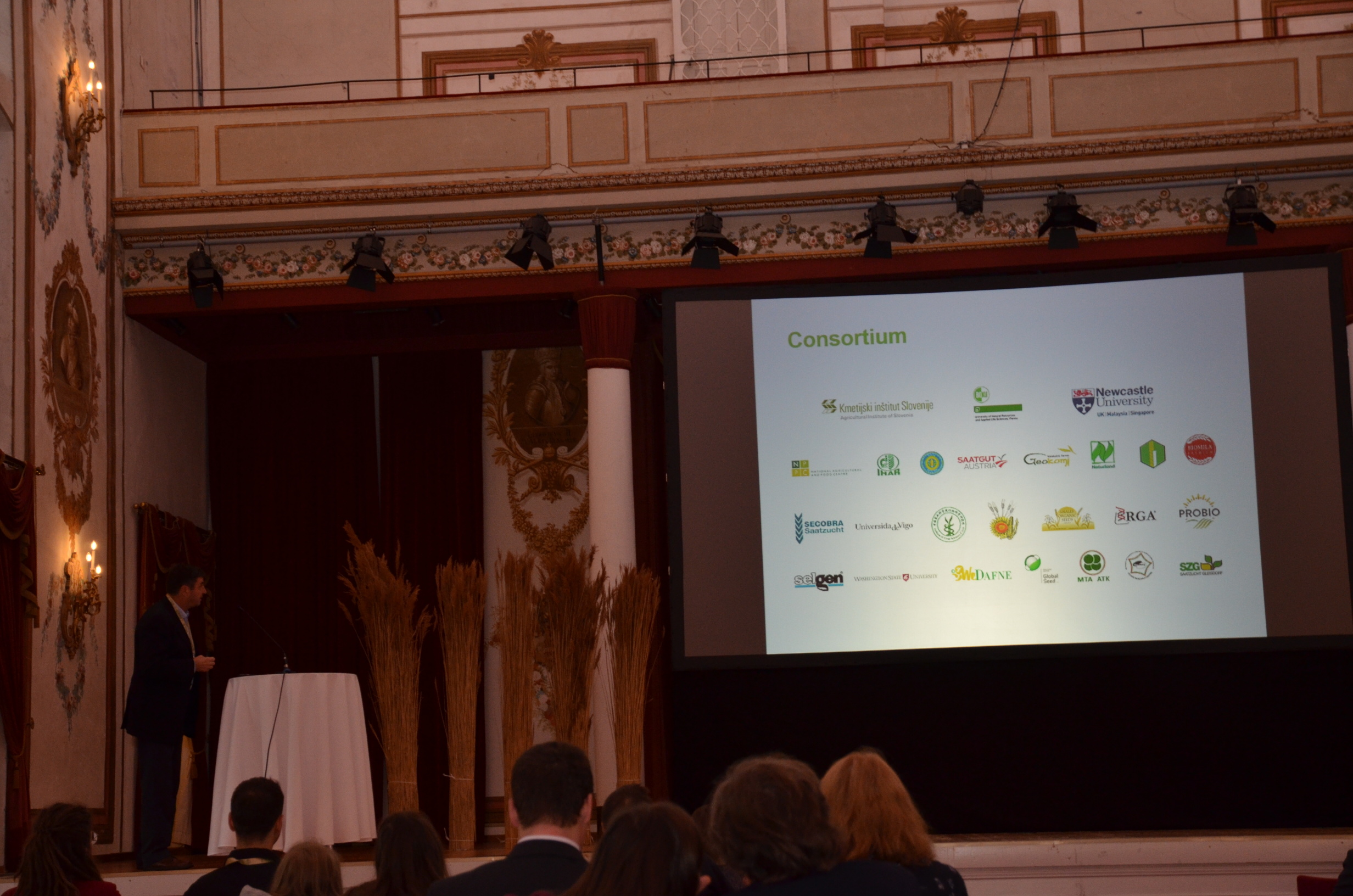
NPPC took part in the MSCA European Researchers’ Night disseminating facts and figures on organic spelt and emmer wheat. New varieties of spelt and emmer wheat were presented. As an add on a degustation of spelt bakery products and spelt coffee was offered. Children were happy to observe the plant seeds under a single microscope.
NPPC took part in the MSCA European Researchers’ Night disseminating facts and figures on organic spelt and emmer wheat. New varieties of spelt and emmer wheat were presented. As an add on a degustation of spelt bakery products and spelt coffee was offered. Children were happy to observe the plant seeds under a single microscope.
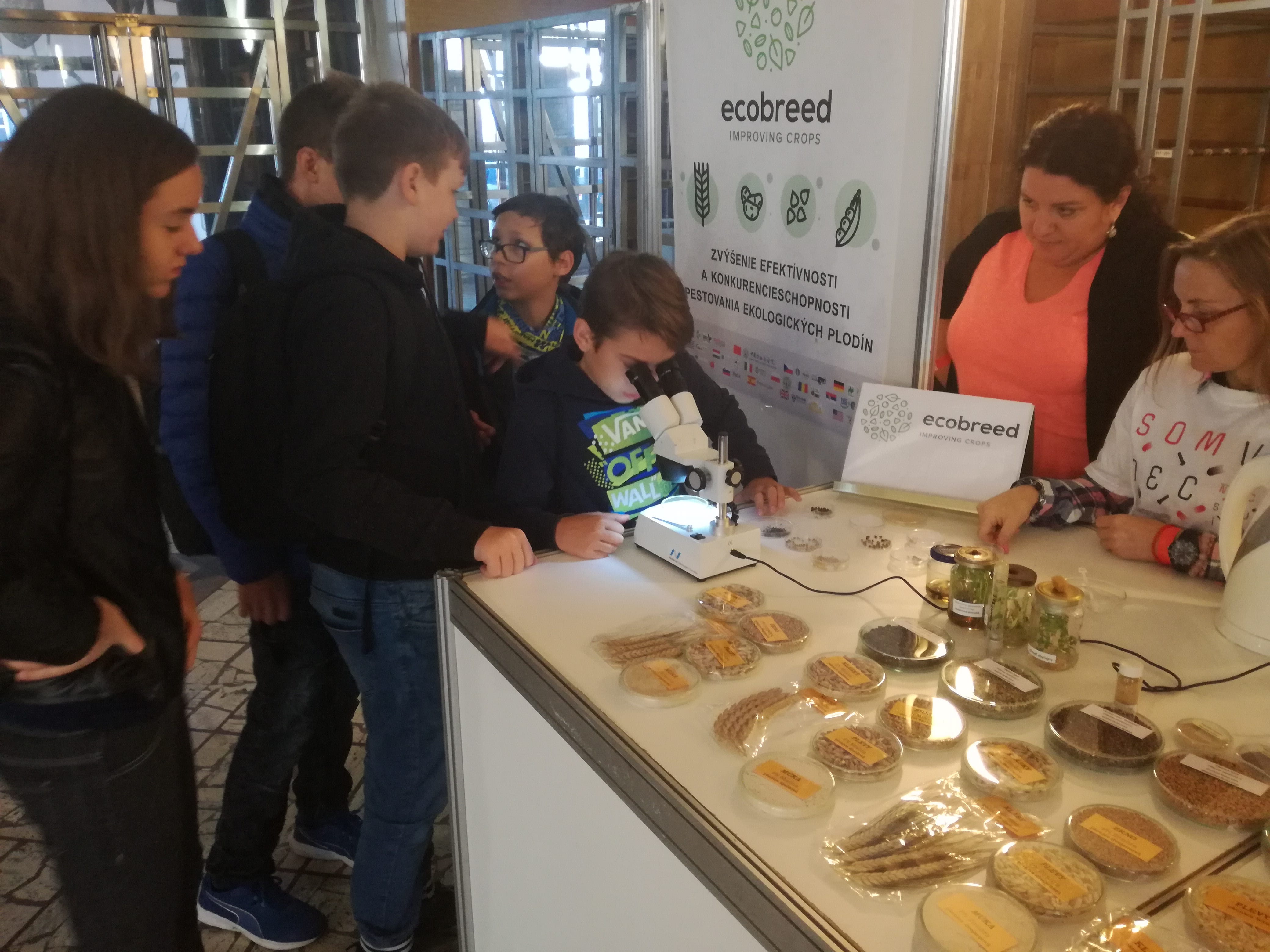
Ecobreed partners are so active recently. Prof. Mario A. Pagnotta from UNITUS is right now attending #FromSeedToPasta conference in Bologna both with a presentation and a poster contributing to the main goal of the conference and namely providing a unique opportunity to learn and debate the latest achievements in durum wheat production and processing and to assess the impact […]
Ecobreed partners are so active recently. Prof. Mario A. Pagnotta from UNITUS is right now attending #FromSeedToPasta conference in Bologna both with a presentation and a poster contributing to the main goal of the conference and namely providing a unique opportunity to learn and debate the latest achievements in durum wheat production and processing and to assess the impact of the durum-value chain on the environment and our health.
The Scientific Fair is a day-long entertainment program for children and youth, as well as for teachers, parents and the general public, that was held on September 14th in Bratislava. The Fair presents different fields of science and research in an interesting and interactive way. NPPC team introduced to the visitors the aim of the […]
The Scientific Fair is a day-long entertainment program for children and youth, as well as for teachers, parents and the general public, that was held on September 14th in Bratislava. The Fair presents different fields of science and research in an interesting and interactive way.
NPPC team introduced to the visitors the aim of the project and presented them the cultivation of wheat in the Slovak Republic and the modern trends in the cultivation of this crop. By using a microscope, visitors could observe different kinds of wheat and different grain color. They also learned about breeding aimed at creating new wheat with higher added value. Children tried how to extract anthocyanins, natural pigments of colored wheat grains and how these substances react to changed pH.
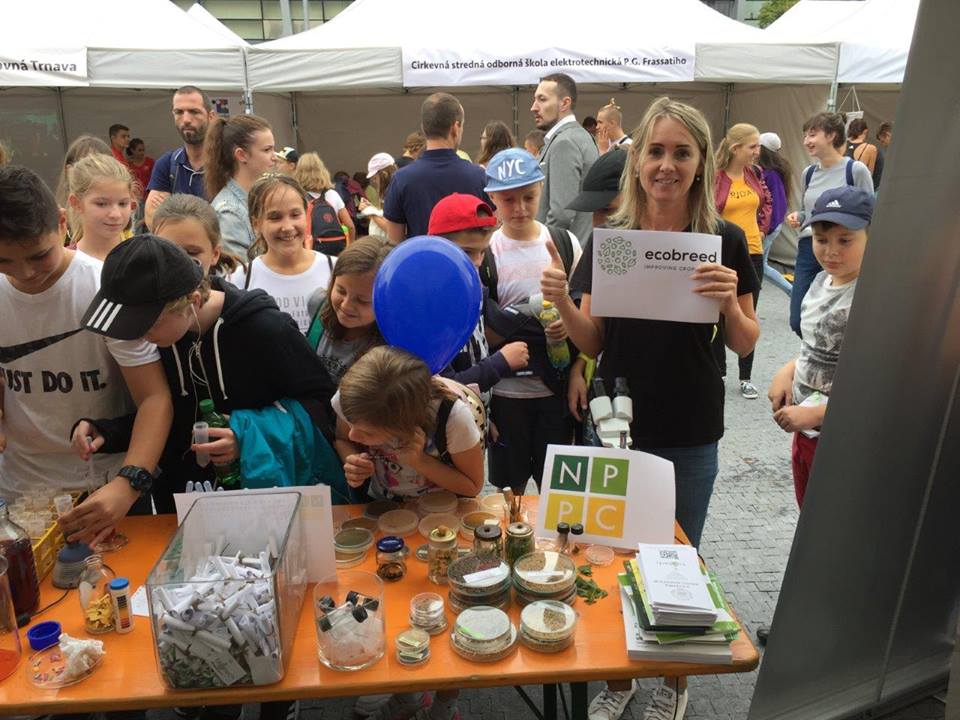
Ecobreed project was a guest at two events during the 56. International Fair of Agriculture and Food in Gornja Radgona #Agra. The project coordinator, Dr. Vladimir Meglič presenting Ecobreed’s objectives both at the event for the importance of use of certified seed material and to the forum, organised by the Strategic Research and Innovation partnership for Sustainable Food […]
Ecobreed project was a guest at two events during the 56. International Fair of Agriculture and Food in Gornja Radgona #Agra. The project coordinator, Dr. Vladimir Meglič presenting Ecobreed’s objectives both at the event for the importance of use of certified seed material and to the forum, organised by the Strategic Research and Innovation partnership for Sustainable Food Production in Slovenia.
Our #H2020 project has been featured in #EuropeanSeedMagazine. Nice article about our objectives for the next 5 years: read more …
Our #H2020 project has been featured in #EuropeanSeedMagazine. Nice article about our objectives for the next 5 years: read more …
With the kick-off meeting held from 27 to 28 June 2018 in Ljubljana, the five-year project ECOBREED funded by Horizon 2020 program, has been officially launched. The project is coordinated by Agricultural Institute of Slovenia and carried out in collaboration with 24 partner organisations representing 15 countries: AT, CN, CZ, DE, ES, GR, HU, IT, […]
With the kick-off meeting held from 27 to 28 June 2018 in Ljubljana, the five-year project ECOBREED funded by Horizon 2020 program, has been officially launched. The project is coordinated by Agricultural Institute of Slovenia and carried out in collaboration with 24 partner organisations representing 15 countries: AT, CN, CZ, DE, ES, GR, HU, IT, PL, RO, RS, SI, SK, UK, and the USA. Participants were addressed by the director of the Institute prof. dr. Andrej Simončič and project coordinator Dr. Vladimir Meglič. Special guest was Ms. Tanja Strniša, State Secretary at the Ministry of the Republic of Slovenia for Agriculture, Forestry and Food, who stressed the significance of the project for the development of Slovenian organic farming.
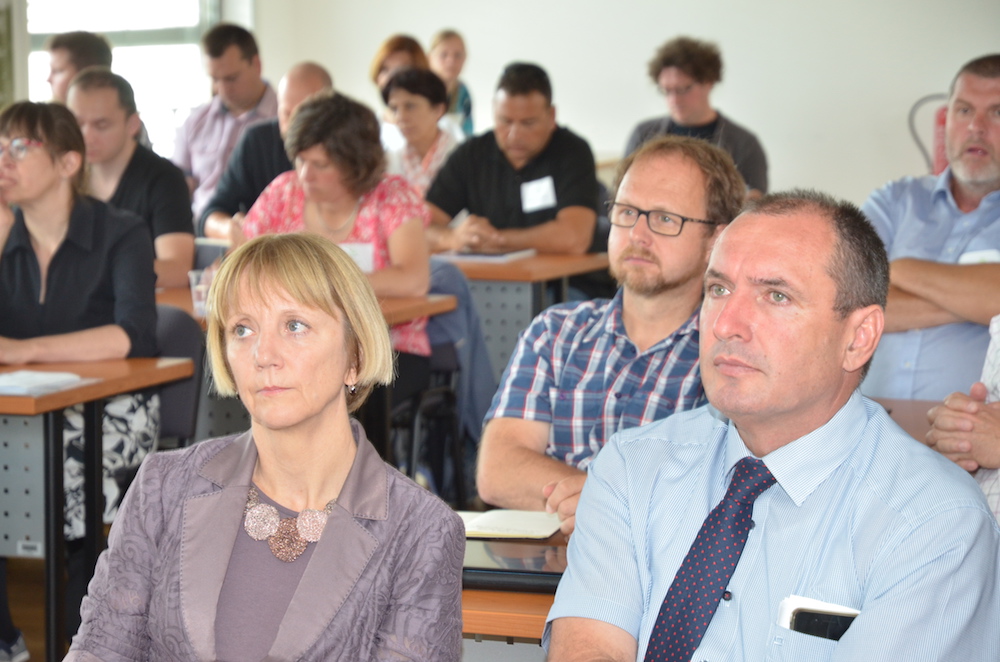
The project will develop (a) methods, strategies and infrastructures for organic breeding, (b) varieties with improved stress resistance, resource use efficiency and quality and (c) improved methods for the production of high-quality organic seed. Activities will focus on four crop species i.e. wheat (both common Triticum aestivum L. and durum Triticum aestivum L., T. durum L.), potato (Solanum tuberosum L.), soybean (Glycine max (L). Merr), and common buckwheat (Fagopyrum esculentum Moench.).
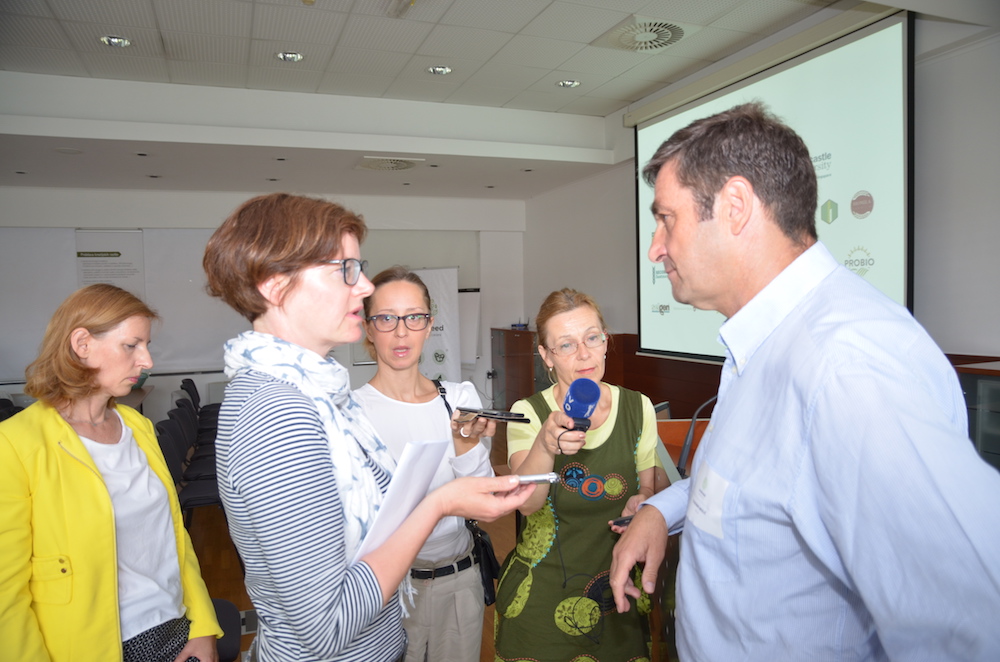
During the following 5 years, the project participants will: identify genetic and phenotypic variation in morphological, abiotic/biotic tolerance/resistance and nutritional quality traits that can be used in organic breeding; evaluate the potential of genetic variation for enhanced nutrient acquisition; evaluate the potential for increased weed competitiveness and control; optimise seed production/multiplication via improved agronomic and seed treatment protocols; develop efficient, ready-to-use farmer participatory breeding systems; pre-breed elite varieties for improved agronomic performance, biotic/abiotic stress resistance/tolerance and nutritional quality; develop training programmes in genomic tools/techniques, farmers participatory breeding, use and application of improved phenotyping capabilities; ensure optimum and rapid utilisation and exploitation of project deliverables and innovations by relevant industry and other user/stakeholder groups.
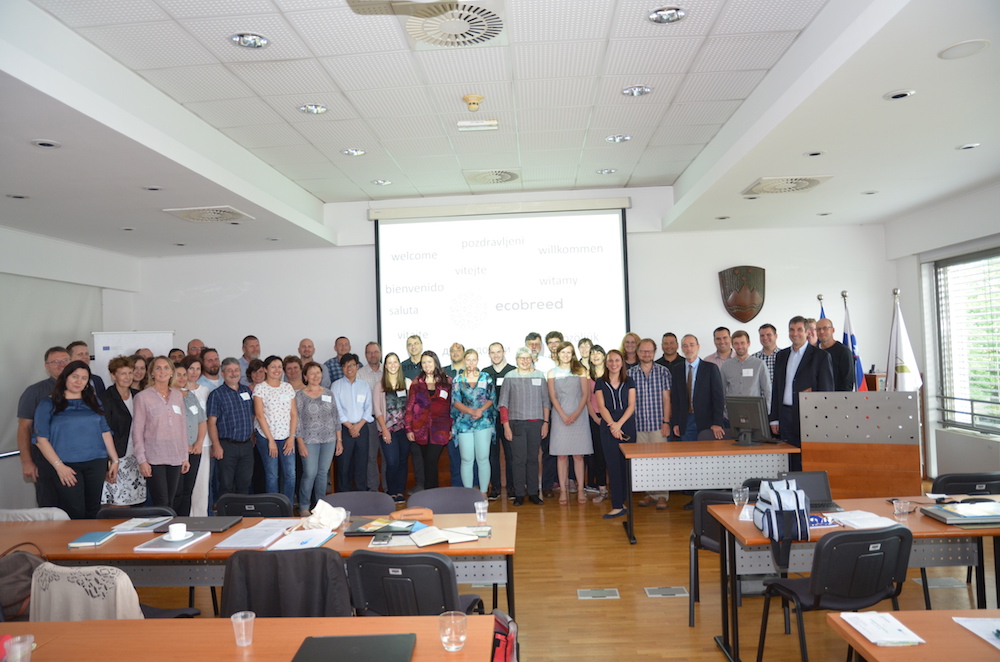
Brussels, 15th of June 2018. Coordinator of Ecobreed project, dr. Vladimir Meglič, and project manager, dr. Antoaneta G. Kuhar have attended Coordinators Day in Brussels for Societal Challenge 2: Food security, sustainable agriculture and forestry, marine and maritime inland water research and the bioeconomy. Ecobreed project was presented during the cluster session “Organic production”. Synergies, benefits and […]
Brussels, 15th of June 2018.
Coordinator of Ecobreed project, dr. Vladimir Meglič, and project manager, dr. Antoaneta G. Kuhar have attended Coordinators Day in Brussels for Societal Challenge 2: Food security, sustainable agriculture and forestry, marine and maritime inland water research and the bioeconomy. Ecobreed project was presented during the cluster session “Organic production”. Synergies, benefits and joint activities were the main drives during the meeting with BRESOV and LIVESEED projects.